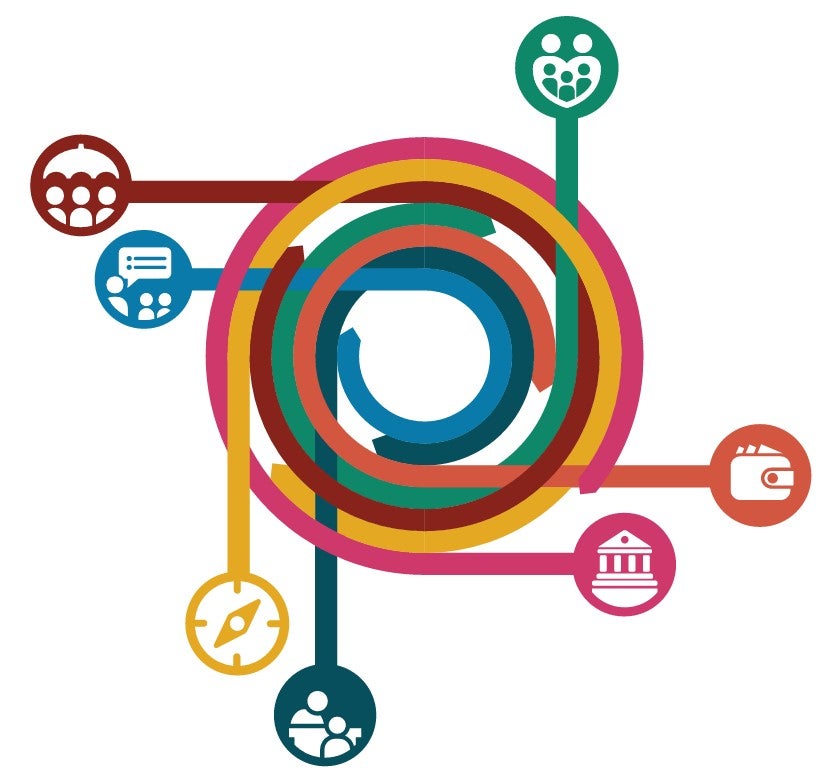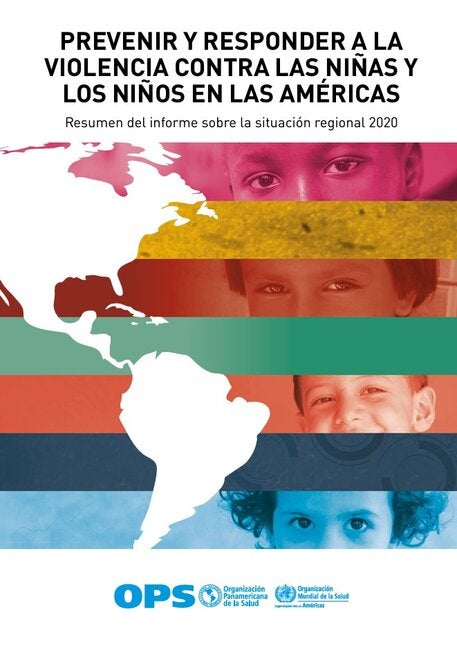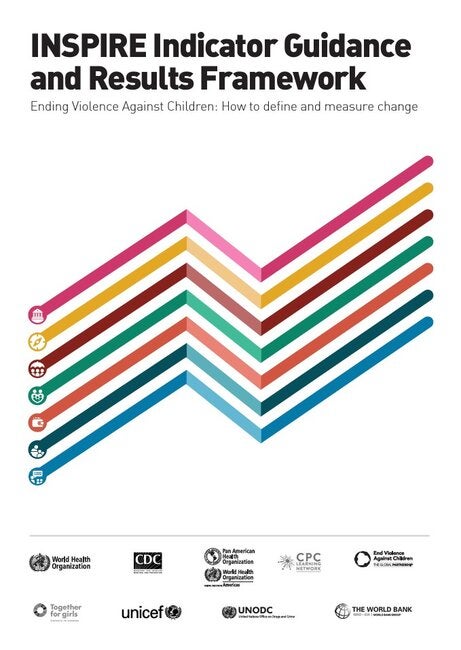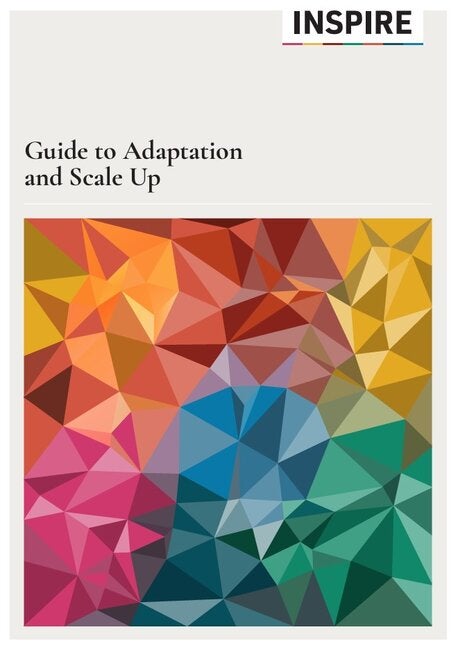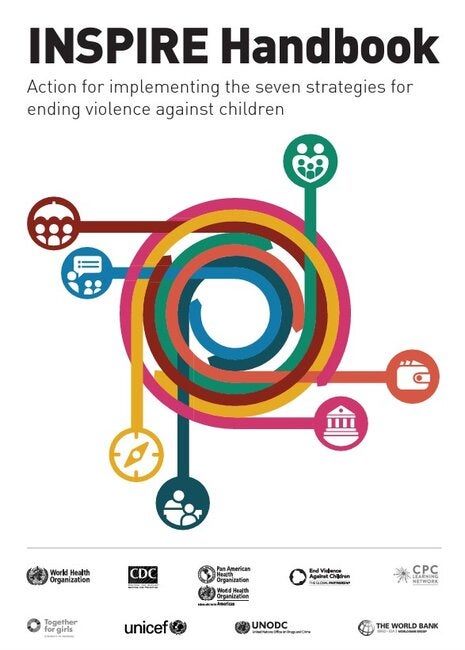Violence against children and adolescents is prevalent throughout the Americas, manifesting itself in various forms. The consequences are significant, impacting not only survivors of violence but also their families and communities.
Violence against children and adolescents can be prevented and its negative health, social, and economic effects reduced. The health sector plays a crucial role in this effort, but successful prevention and mitigation require coordinated actions by all sectors of government, civil society, academic institutions, professional associations, international partners, and communities.
The INSPIRE framework aims to end violence against children and adolescents through seven evidence-based strategies. Each has a specific objective and justification and is supported by activities aimed at achieving other Sustainable Development Goals and contributing to their achievement. These goals seek to eliminate risk factors associated with violence in childhood, such as those addressing poverty, health, gender equality, education, equity, safe environments, and justice, and are therefore important to include in programs to prevent violence in childhood.
It describes the potential impact on violence prevention, details specific programs, practices, and policies to advance each strategy, and provides evidence to support these approaches.
Implementation and enforcement of laws
Norms and values
Safe environment
Parent and caregiver support
Income and economic strengthening
Response and support services
Education and life skills
The publication of the global theoretical framework and implementation guide was an important step forward, as it helped countries update evidence-based policies and programs to prevent violence against children and adolescents.
A challenge in facilitating, implementing, and adapting the global guidance is the lack of comprehensive administrative data systems in many countries, where only a small fraction of acts of violence against children and adolescents are reported to official sources, such as education, health, justice, or social welfare systems. This problem is exacerbated by a lack of awareness or training among officials, and a lack of implementation of prevention or response actions. Furthermore, the delivery of evidence-based prevention programs and services depends significantly on the strength of the systems that underpin each sector, the readiness to address the problem of violence against children, and effective mechanisms for coordination between these sectors.
In response, the regional office for the Americas and the Caribbean, as highlighted in the 2020 Regional Status Report on the Prevention and Response to Violence against Children, recognizes numerous experiences and lessons that can be shared and leveraged, along with available data to monitor and measure change. The report aims to improve the translation and generation of knowledge in the Region, guiding future efforts to sustain progress. PAHO stands ready to collaborate with countries and partners to expand the evidence base, improve health system responses, strengthen prevention and response capacities, and continue monitoring and reporting on comprehensive violence prevention progress.
ACTIVITIES AND INITIATIVES CARRIED OUT
Click on the titles within the colored bars to display their contents.
PAHO, in collaboration with UNICEF, the Global Partnership to End Violence against Children, Together for the Girls, and the United States Centers for Disease Control and Prevention, organized a series of virtual events inviting government representatives from various sectors and from several Caribbean countries to focus on the global INSPIRE framework.
The workshops, held on May 15 and 24, 2023, addressed the urgent need to prevent violence against children and adolescents in the Region through evidence-based, multi-sectoral, and multi-stakeholder interventions. These events aimed to strengthen capacities among government sectors, civil society, and other partners in INSPIRE strategies to end violence against children and adolescents. These sessions focused on the six essential INSPIRE strategies: Standards and Responses to Children and Adolescents Who Have Been Sexually Abused: WHO Clinical Guidelines, Safe Environments, Support for Parents and Caregivers, Response and Support Services, Education and Economic Strengthening.
On June 14, 2024, PAHO, in collaboration with National Data Focal Points from 22 countries in the Americas, met to discuss data collection methodologies and tools to include in the Second Global Report on the Prevention of Violence against Children and Adolescents.
The workshop focused on initiating the data collection process at the national level using standardized questionnaires aligned with the INSPIRE technical package. This collaborative effort, involving government sectors and WHO representatives, aims to compile comprehensive data by the end of 2024, with the report's publication planned for mid-2025. PAHO's partnerships with national focal points and key actors underscore its commitment to generating crucial insights and advancing violence prevention efforts across the Region and beyond.
Preventing violence against children: INSPIRE webinar series-Introduction and cross-activities
Preventing violence against children: INSPIRE webinar series- Implementation and enforcement of laws
Preventing violence against children: INSPIRE webinar series- Norms and values
Preventing violence against children: INSPIRE webinar series-Safe environments
Preventing violence against children: INSPIRE webinar series-Parent and caregiver support
Preventing violence against children: INSPIRE webinar series- Income and economic strengthening
Preventing violence against children: INSPIRE webinar series- Response and support services
Preventing violence against children: INSPIRE webinar series- Education and life skills
Next steps: + ⬇️
- To address the global problem of violence against children, the Governments of Colombia and Sweden have partnered with WHO, UNICEF, and the UN Special Representative for the Elimination of Violence against Children to organize the first Global Ministerial Conference to End Violence against Children from 7 to 8 November 2024.
- Explore opportunities for the INSPIRE Framework Implementation Workshop in other Latin American countries.
IMPORTANT DOCUMENTS
INSPIRE: Seven Strategies for Ending Violence Against Children (Only available in Spanish)
The package aims to unite efforts and raise awareness of the pervasiveness of violence, and deepen engagement in prevention and intervention. Anchored in the Convention on the Rights of the Child, it addresses the wide-ranging and costly impacts of violence on public health and development. It serves as a crucial tool to achieve Sustainable Development Goal Target 16.2, which seeks to end all forms of violence against children. It also contributes to achieving other SDGs, including Goals 1, 3, 4, 5, 10, and 11.
Preventing and responding to violence against girls and boys in the Americas: Regional situation report 2020 (Only in Spanish)
This report, the first of its kind for the region, is a significant milestone based on the seven strategies of the INSPIRE framework. It provides a detailed analysis of strategies and approaches to prevent and respond to violence against children and adolescents in alignment with the Sustainable Development Goals. Published during the COVID-19 pandemic, the report underscores the urgent need for action and establishes a baseline of efforts to address violence against children in the region.
INSPIRE Indicator Guidance and Results Framework
The guide was created to help governments and NGOs monitor progress and track changes over time when implementing INSPIRE strategies. It includes core indicators and detailed guidance on defining and measuring them in different contexts and over time, along with a results framework. The indicators are designed to be used alongside the detailed programming guidance provided in the INSPIRE Implementation Handbook.
INSPIRE Guide to Adaptation and Scale-Up
This guide is a resource for adapting and scaling up violence against children prevention programs to ensure they are as closely aligned as possible with existing evidence and are part of each country's national action plan. It is a practical and flexible tool to support policymakers and practitioners in making decisions as they select, adapt, and implement activities to prevent and respond to violence against children and adolescents.
INSPIRE handbook: action for implementing the seven strategies for ending violence against children
The INSPIRE Handbook provides detailed guidance on selecting and implementing interventions to end violence against children, tailored to specific needs and contexts. It covers the seven specific INSPIRE strategic areas. It concludes with a summary of INSPIRE’s implementation and impact indicators, based on the complementary INSPIRE Indicator Guide and Results Framework.
Learn how governments can play a crucial role in preventing violence against children
Globally, violence affects one in two children annually, causing immediate and long-term harm to individuals and families and undermining health, education, and future productivity. The INSPIRE report offers accessible guidance on effective prevention methods. The 2020 Global Status Report on Preventing Violence Against Children reviews countries’ progress in implementing these strategies, identifies gaps, and offers recommendations to improve and accelerate national efforts.
Learn how the INSPIRE technical package can help
This webinar introduces INSPIRE, presented by Dr. Alex Butchart from WHO and Ms. Sabine Rakotamala from the Global Partnership to End Violence against Children. This technical package offers a collection of evidence-based strategies and interventions designed to prevent and reduce violence against children.


